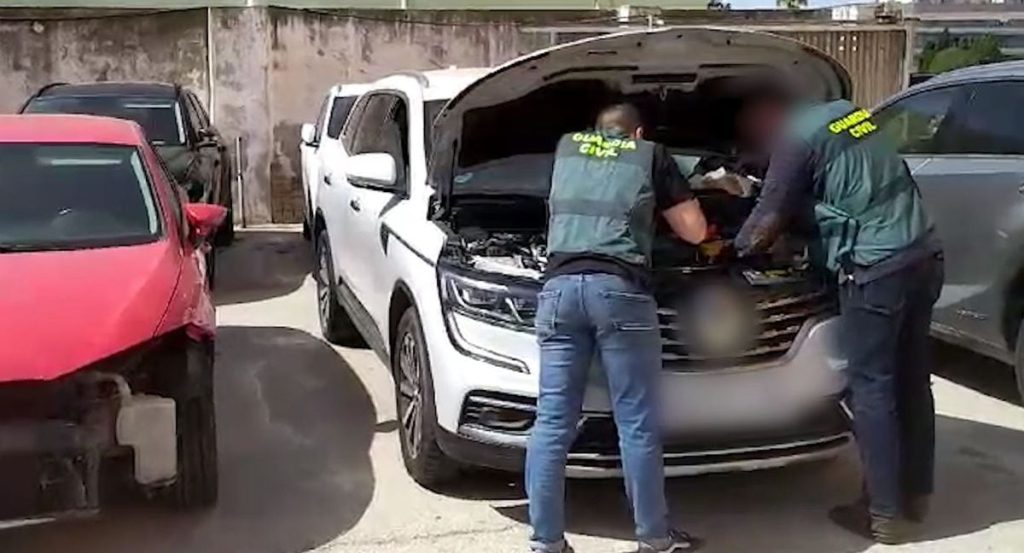An organized gang formed by just five members was able to steal vehicles, modify all their identification and tracking components, re-register them with fake plates, and put them up for sale. They used high-tech tools and devices to pass off their merchandise as other vehicles of the same make, model, and color, either after being wrecked in an accident or still in circulation. After a year-long investigation, the Civil Guard of Alicante managed to identify the members of the criminal group, dismantle their entire infrastructure, and return some of the stolen cars to their rightful owners. Four of them, including a father and son, have been arrested, and the fifth has been declared as being under investigation for the alleged crimes of motor vehicle theft, document forgery, and belonging to a criminal organization. After appearing before the court in Dénia (Alicante), the arrested individuals have been released on bail.
The operation Pima-Kradsti began in April of last year when armed institute agents detected the initial evidence that a highly sophisticated network dedicated to vehicle theft was operating in the northern part of the province of Alicante. It was a well-structured group that did not need the involvement of others to steal cars, preferably mid-range vehicles for an easy market exit, manipulate their security and tracking components, disguise them, as per police terminology, to pass them off as other identical vehicles, and offer them on second-hand vehicle buying and selling websites, as explained in a press conference by Colonel José Hernández, chief of the Alicante Command, Lieutenant Colonel Antonio Darder, chief of the Judicial Police Headquarters in Alicante, and Lieutenant Rubén Sanz, from the Illicit Vehicle Trafficking and Heritage group of the Central Judicial Police Unit.
The vehicles were stolen in the provinces of Alicante, Madrid, and Valencia, and even one in the Netherlands, according to Darder. They were then parked in public places, with occasional transfers, to ensure that they did not have a GPS system that the owners could use to track them. After this period, they were taken to workshops operated by the criminal organization in the municipalities of Benissa and Xàbia in Alicante, where they were altered. Machinery and tools were used to clone keys and control units, laser cutters to make license plates, frequency detectors and inhibitors, micro-cameras, and even original stamped papers with their corresponding stamps to falsify documentation.
Once the vehicle was in the workshop, the network completely disguised them to pass them off as legal cars. They observed similar vehicles in foreign countries such as Sweden, Denmark, Ukraine, Germany, or Poland, or in Spain, noting their license plates. They then falsified the documentation and identification elements distributed by the various manufacturing brands throughout the vehicle to pass them off as wrecked cars that the gang members had identified and purchased with all the required papers from scrap yards. They altered the VINs located in the engine, glove compartment, doors, or under the seats by filing new numbers or covering them with hard-to-detect stickers. They also produced license plates belonging to other identical vehicles and inserted them into the legitimate Spanish traffic circle before selling them.
The Civil Guard operation, with the involvement of Organized Crime and Judicial Police officers from various divisions, along with the collaboration of the police forces of Bulgaria, Sweden, Poland, and Europol, lasted almost a year. Surveillance of the suspects was reportedly challenging as they took extensive security measures, always ensuring they were not being followed, and using shuttle vehicles to clear the path for newly stolen vehicles being transported at any given time. On March 6th, raids were conducted on the suspects’ residences in Dénia, Xàbia, Teulada, Calp, and the Valencian municipality of Gandía, as well as on the organization’s mechanical workshops. Thirteen stolen vehicles were recovered, and efforts are being made to identify four others. The total number of cars traded by the gang remains unknown. Following the operation, four individuals, aged between 19 and 50, all of Bulgarian nationality, were arrested, with one more individual under investigation. Investigators believe this criminal group specializing in dismantling stolen vehicles in Spain reached the highest levels of sophistication.


